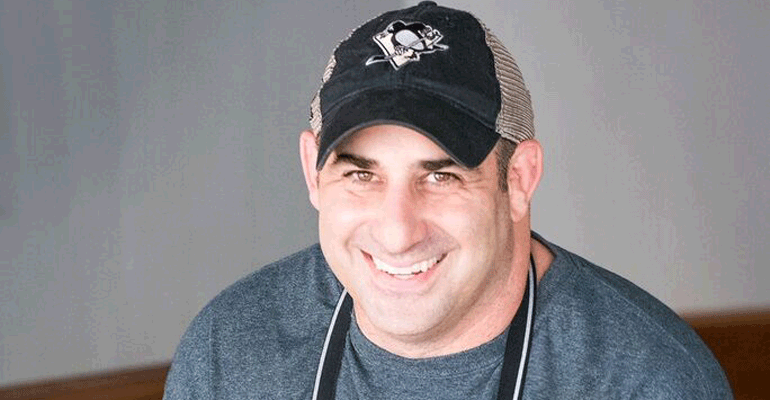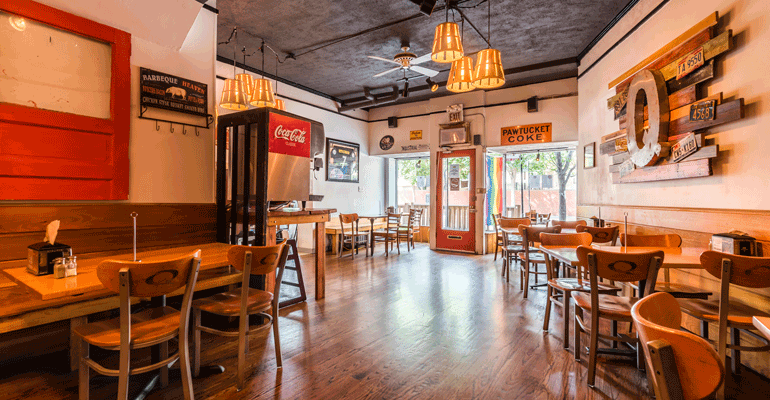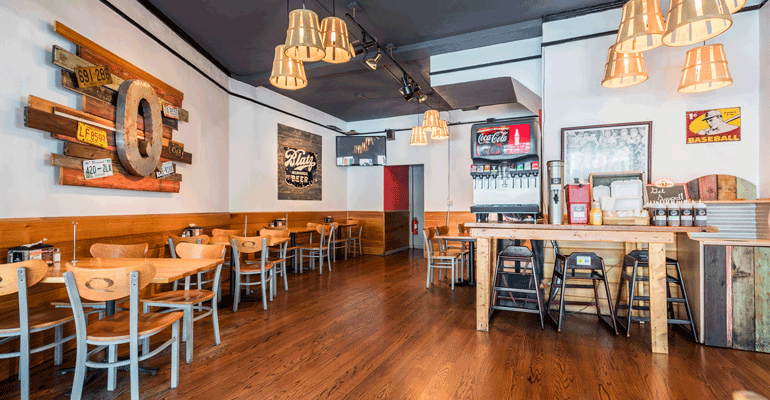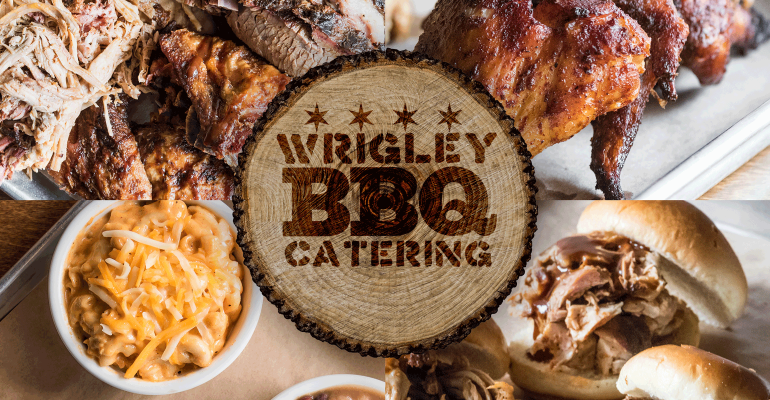Wrigley BBQ owner and pitmaster Mitch Liebovich has been smoking briskets since he was 3 years old. When he opened the restaurant in Chicago about a year ago and started smoking meats over oak, hickory, apple and cherry woods, it was a surprise to no one.
Over the past year, he’s navigated the Windy City’s crowded restaurant scene and added significant catering gigs to beef up business.
Since Chicago doesn’t have a strong definition of barbecue, Wrigley BBQ isn’t tied to any one regional style, so this is a place that can dip into the best of everything.

Wrigley BBQ owner and pitmaster Mitch Liebovich
Wrigley BBQ’s menu samples freely from the smoky goodness, savory rubs and finger-lickin’ sauces from regions across the country. Diners will find brisket, pulled pork, spice-rubbed jumbo chicken wings and St. Louis-style ribs, much of the meat incorporated into creative menu items like the Sam & Erna Sandwich (a smoky, succulent combination of brisket and pulled pork); signature desserts like S’mores Pie; and a variety of “smokin’ sides.” There’s also a solid selection of burgers, something not all barbecue joints offer.
Liebovich discussed sourcing meat, finding the right equipment, building a following and incorporating catering.
How would you describe your barbecue style?
While the Wrigley BBQ signature rub is sweet and savory, we pride ourselves on creating dishes that incorporate the best flavors from all around the country. Wrigley BBQ features four distinct, homemade sauces inspired by the traditional BBQ styles of Memphis, Carolina, Texas and the Southwestern United States.
In terms of catering versus retail, how did you first identify your go-to menu stars?
In the first few weeks after Wrigley BBQ opened, it became very clear what our go-to menu items would be. Brisket and pulled pork were, and continue to be, our best-selling dishes by far. Our catering menu is completely customizable, so the favorite menu items differ with each special order, but across the board it seems the common go-to choices are our brisket and pulled pork.
How much of your business is made up of catering?
Our catering services currently account for about 20 percent of the business.

Did you start out in the catering game or were you a brick-and-mortar restaurant first?
We started out with just the physical restaurant, but after receiving so many requests from our customers to cater their parties and special events, we quickly added catering to our repertoire.
What types of events do you cater most?
From birthday parties and graduations to reunions and weddings, we strongly believe barbecue is the perfect catering option for any and every event. Most of our catering jobs require a simple drop-off and set-up, but sometimes our team will stay on-site and serve the food. I think that’s just the nature of barbecue — it’s casual, approachable and everyone winds up being happy with a BBQ buffet.
Do you hire part-time workers for catering jobs? If so, are there any challenges with that?
We always try to bring in our talented team of full-time employees for events since they know better than anyone how to prepare and serve our food. But when we need an extra hand, my super-supportive family members are always there to jump in!
What are some of the most valuable lessons you’ve learned about barbecue catering that you can share?
Planning an event is stressful, especially when it comes to selecting a menu. Most of our customers ask for guidance in what they should serve at a party. Even if they’re set on barbecue, they often won’t have an idea of what type of barbecue should be served, whether it’s brisket, pulled pork or smoked chicken. I find it best to ask a lot of questions; learn about their likes, dislikes; and what sort of eaters they’ll have at their party.
Budget is also important to keep in mind. Even if the customer has seen the menu, it’s important to be on the same page right from the start and clue them in on your fees. You never want it to be a surprise when it comes time to sending them the final bill, so be sure to ask upfront what their budget is and discuss how you can work together to give them the catering they want. My usual routine is requiring a deposit upfront to ensure costs are covered in the event of a cancellation.

What’s a business mistake that you made and found a solution for?
There’s no question that location is one of the biggest keys to a restaurant’s success. I loved my first restaurant location in the Brookline neighborhood of Pittsburgh, but I didn’t anticipate the lack of traffic during the week, especially since we hadn’t secured a liquor license. Instituting a BYOB policy with no corking fee, as well as boosting catering orders, helped alleviate some of those issues, but ultimately the best solution was finding a better location. I’ve seen far greater success at Wrigley BBQ in the Lakeview neighborhood of Chicago.
What are some key things to keep in mind if you’re trying to run a lucrative catering game, either on the side or as your main business?
I think the biggest key is having an eagerness to learn from your experiences by asking questions. Before finalizing the order, learn about the event and the people in attendance, and get to know your customer’s preferences. Will they need plates, cutlery, napkins, cups, etc.? What budget do they have in mind, and are they prepared to pay a deposit? Most importantly, ask questions after the event and use that feedback moving forward. What did you like or dislike about the catering? Are there areas you think we could improve, or something we can offer that others won’t?
Another key consideration, especially for small businesses, is to utilize your loyal customer base and tap into their networks. Business lunches, for example, are very lucrative and can be a great source of repeat business.
Finally, be early for catering events. On time is late, in my opinion, and I always leave plenty of room for traffic and delays. Food is often the center of a party, and the last thing you want is to leave your customers with the notion that you were unprepared or lacked interest in their party. That’s one of the quickest ways to lose future business.
Contact Tara Fitzpatrick at [email protected]
Follow her on Twitter: @tara_fitzie





